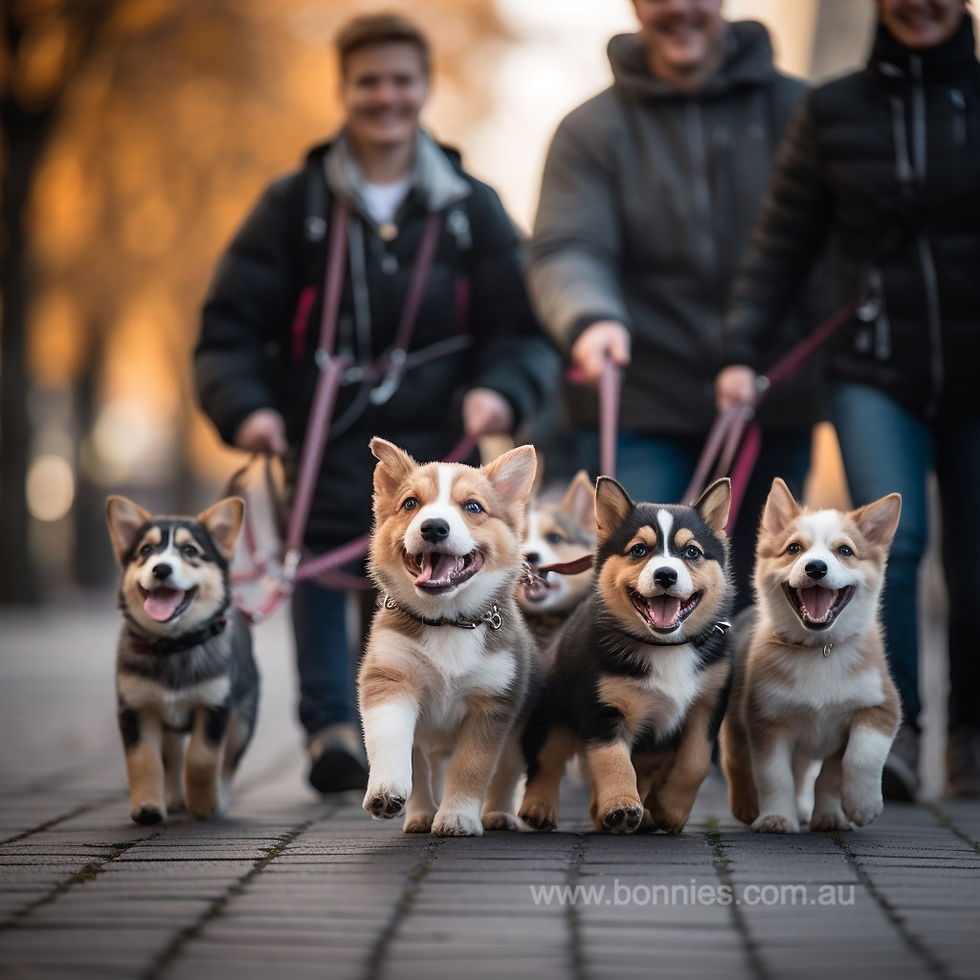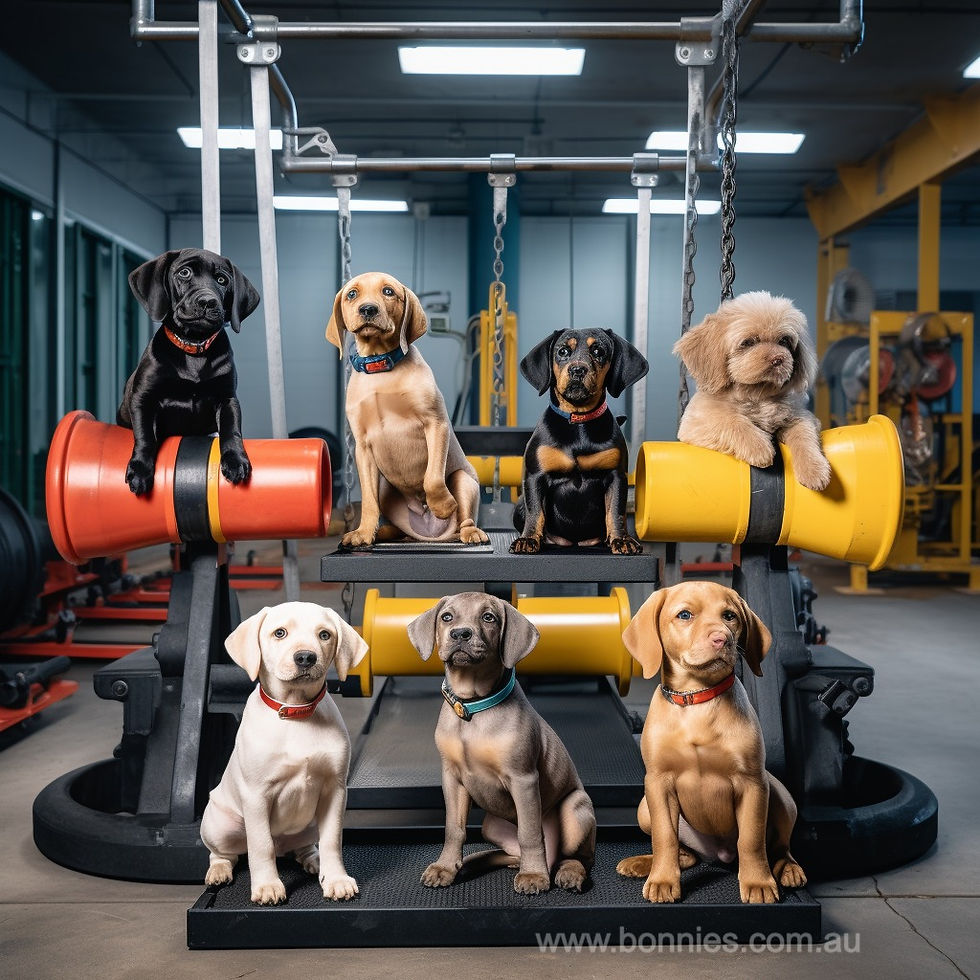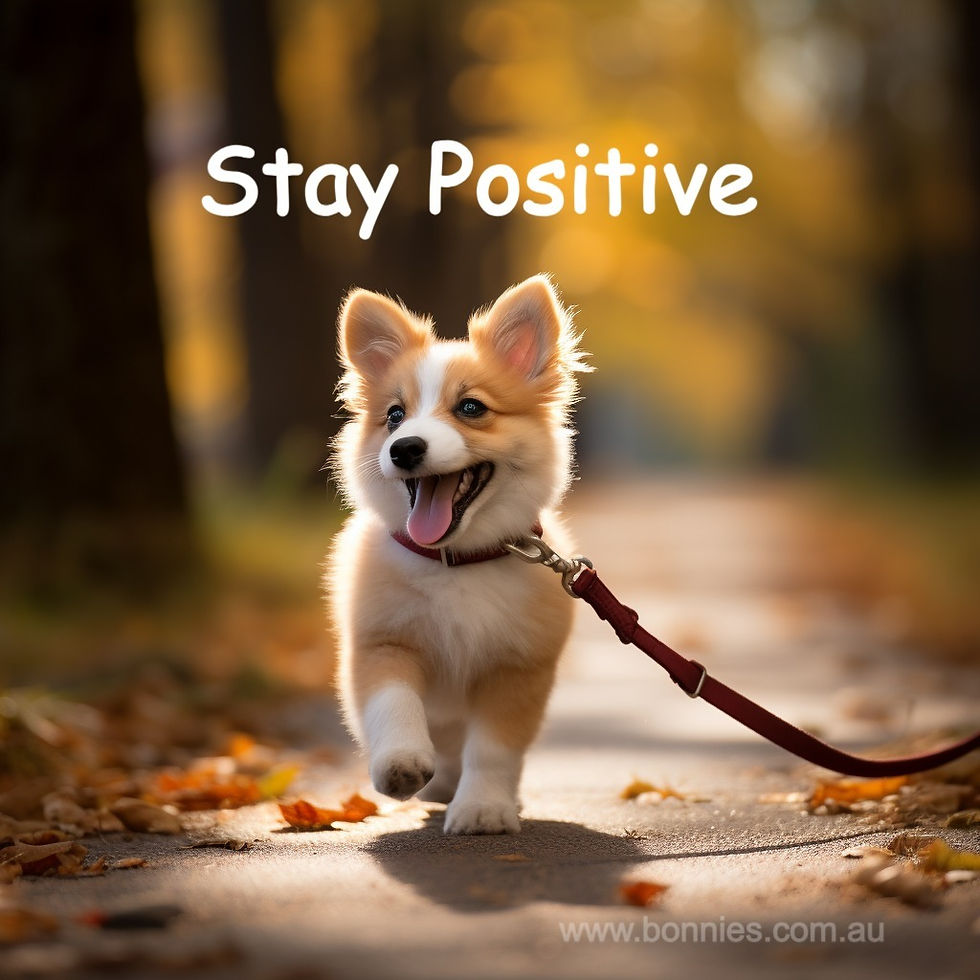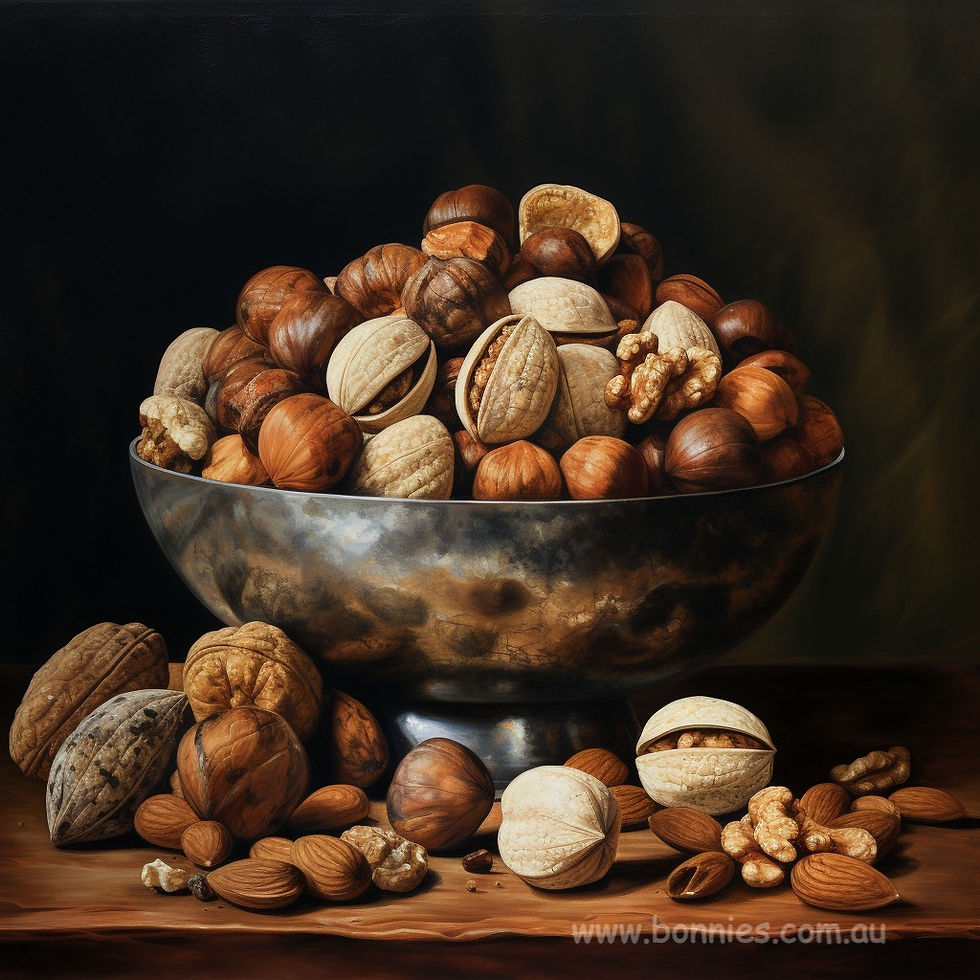When is the Best Time to Begin Puppy Training? From Vaccinations to Vital Development Stages:
- Peter Bonney Director
- Aug 8, 2023
- 8 min read
Updated: Feb 13, 2024

When is the Best Time to Begin Puppy Training?
NOW! Embarking on the journey of welcoming a puppy into your life could and should be a real adventure, filled with promise and friendship. Alongside the joys of puppyhood come very important Personal and family responsibilities. Determining the optimal time to commence your puppy's training, is an essential step towards fostering their growth, and establishing a bedrock of positive behavior for life. This article, written by Puppy Trainer Peter Bonney, sets out to explore a range of facets from the 5 Phases of training your puppy, to include "Health as a Priority", too.
It's important to prioritise their health and safety through vaccinations and health checks Fist. Before anything else our puppys health is priority #1. Training priority #2. Puppies must receive a series of vaccinations and checks, in order to safeguard them, against a range of canine diseases. I suggest that you discuss this and any health issue with your Vet. I would suggest that "self diagnosing our puppies health" is not a good idea. Your puppy deserves the very best not just the best intentions.
If you have utilised a professional breeder they would have given you more information on this too. Follow the instructions from your breeder. If you have not yet selected your puppy, then there are lots of important questions, you may like ask to your breeder before you choose. I know, once you see them, we as humans fall in love with them "In the first 3 seconds" Right? Do the research on the interweb, on the Breed your thinking about, then Choose the Breed and Speak with different professional breeders and their Associations in your area, as they are there to help you, not sell you or give you the wrong dog. Then when you do go to see your New Best mate, and fall in love, it will be with the right breed for you and your circumstance. Smart and informed owners start the training the day before the puppy comes home. Human understanding of the breed you are getting, setting rules at home etc. Professional dog training “sets you and your dog - up for success”.
So When is the Best Time to Begin Puppy Training? Now. Puppy school between 8 and 18 weeks of age. Once they have been checked over by your vet. They will suggest the rate and timings of those vaccinations. Typically initiated at around 6 - 8 weeks of age, this inoculation regimen must be tailored to your puppy's individual needs and susceptibilities best discussed with your veterinarian and breeder. With your puppy's vaccinations up-to-date, you're poised to embark on their training journey with confidence. Ensure your puppy has begun their journey by having their first inoculations organised at the right time by your breeder. Pro breeders are very specific and correct with the right timings of these.
Should we train early and take a risk with transferable diseases?
At Bonnies we have many clients ask this important question, about "when to train". Should we train early and take a risk with transferable diseases? A really tough one, as we know the real value of getting a puppies journey off on the right step as soon as possible. YES, there is always a risk with taking a puppy out BEFORE you get full vaccinations. You can not be guaranteed, that a puppy won't pick up something, which affects their health. We believe all puppy classes everywhere, and run by different companies, suggest to their clients, that their puppies have had at least their first vaccinations and often their second too, in order to participate. If you do not feel comfortable taking them out at all, until they are fully vaccinated, you also have some great choices to learn about training. Reading different content and taking an interest in your puppy will pay you back for a lifetime. If you choose to wait until your puppy has all inoculations before starting puppy training in a group, that’s perfect. Chat to a pro trainer, read articles and implement positive and family friendly rules for your puppy. Book them in to the Puppy School and off you go.
What are the 5 Key Development Phases for Training?
As you will see these development periods or phases cross over each other. Each puppy and every family is different so the timings of these are varied.

What is the first phase of training a puppy?
This critical phase is the Socialisation period (3 - 16 weeks) stands as a cornerstone of your puppy's development, characterised by an openness to novel experiences, human interaction, and engagement with fellow animals. Val Bonney, mum, says that this is the most important IMPRINT Period. Skillfully orchestrated exposure to diverse stimuli during this window bolsters your puppy's self-assuredness and curbs the potential emergence of fear-based behaviors in the future. The seeds of socialisation are sown in the very fabric of their pack and breeder interactions. It's vital to recognise that socialisation is an ongoing process that extends beyond these weeks and months, permeating your puppy's entire life. Every fresh encounter your puppy encounters becomes an opportunity for training and collaborative interaction, fostering resilience and thwarting anxieties.
What is the second phase of training a puppy?
Amidst the stages often overlooked, the familiarisation period (2 - 12 months) assumes paramount importance. Misconceptions about puppies merely "getting used to" objects like brooms, hair dryers, or vacuum cleaners abound. However, such adjustment doesn't happen by chance—it's a deliberate process of acclimatisation. Employing a "Show and Tell" approach, we introduce our puppies to potentially alarming elements in a controlled manner. By facilitating these introductions, we pave the way for a more confident and composed adult canine companion.
What is the Third phase of training a Puppy - Dog?
The 3rd period of training is the Juvenile Period from (4 - 7 months) marked by burgeoning physical coordination and abilities, the juvenile period is a platform for initiating foundational training. Basic obedience commands like sit, stay, and recall come into play, facilitated through the application of positive reinforcement techniques. Consistency and patience emerge as the guiding principles for nurturing desirable behaviors. This stage forms a bridge between puppyhood and adolescence, providing a bedrock for more intricate training endeavors.
What is the fourth phase of training a Puppy - Dog?
This period or phase is the Adolescent Period (6 to 18 months). The parameters for when certain breeds transition from puppyhood to adulthood can vary; for instance, some breeds mature by 12 months, while others are considered adolescents up to 18 months. This phase is marked by a burgeoning sense of independence and an insatiable curiosity that fuels exploratory ventures. Although this period may present challenges, it equally unveils opportunities for reinforcing training fundamentals and upholding a steadfast demeanor. Venturing into more intricate commands and behaviors necessitates a skillful blend of assertiveness and compassion.

Guiding your adolescent dog toward maturity calls for a nuanced approach that intertwines gentle guidance with unwavering resolve and positive interactions. It's important to note that between 9 and 12 months, your adolescent dog may enter, what I call a "Crazy Period." If your training and consistency are well-established, this phase can be managed successfully. It's not uncommon to find yourself wondering, "Where has my dog's behavior gone?" or "Why isn't my dog listening?" or "Who stole my dog"? during this time. Understanding that this is a normal phase helps ease any concerns that might arise but actions need to be taken, asap, to continue their more formal training.
What is the Fifth phase of training a Puppy - Dog?
The adult period (12 months to 2 years) depending on the breed, opens a window for long overdue socialisation and training, enhancing your dog's behaviour and enriching their social interactions. This phase underscores the enduring capacity for growth and development throughout a dog's life. It's never too old to train a dog. Many people who have bought their dogs to us at Bonnies are very surprised as to what can be achieved. Many dogs come to us and may be very anxious. Why does this happen?
Simply put, many beautiful people adopt dogs at an older age and don't know what they are getting. Verey well intentioned people can struggle when they get their new mate home. It's generally only then, that they realise more work needs to be done, in order to fully integrate them with their new pack.

What approach should I take to train my dog?
Positive Reinforcement: Universally advocated, reward-centric training forms the cornerstone of Bonnies effective training. Employ treats, praise, and playthings to celebrate desired behaviors, fortifying the association between good conduct and positive outcomes.
Consistency: Canine contentment flourishes when there are rules and routines. Never give your puppy or dog more than 1 command. So, please don't say sit, sit, sit. Tell them once, that's why these are called commands. Uphold rules and commands consistently, orchestrating a symphony of harmony among all household members to circumvent any potential confusion. Unity among all family members is imperative; a shared understanding and commitment to consistency stands as one of the most invaluable recommendations that I can offer to everyone.
Patience: The art of training necessitates both time and a big bucket of patience. Embrace your puppy's journey, encompassing both advances and setbacks, with a sense of balance. Refrain from resorting to punitive and harsh techniques that could inadvertently foster fear and aggression. Please don't yell at them during moments of inevitable frustration, take a pause. Step back, recalibrate your mindset, and you'll find that adopting a more relaxed and refreshed approach yields a markedly improved response from your Best Mate. The ability to be relaxed when you train is so necessary even more for Dog Trainers. The times I have made errors and poor judgement calls, is when I am in a stressed or very busy, state of mind. Everyone gets stressed. No one is perfect.

In a Nutshell: So, when's the right time to kickstart your pup's training adventures? Well, it's where the "magic mix" or "Secret Sauce" of keeping your buddy's health in check and their growth milestones meets. Those oh-so-important socialisation, teenage-ish juvenile, and the 'I'm finding myself, so don't bother me,' adolescent phases are your golden opportunities. With a splash of practical wisdom and down-to-earth tactics, you're crafting a roadmap for your pup to strut through life like a pro. Remember, every pup is a unique character, deserving a training plan that dances to their own tune. Patience, dedication, and a sprinkle of rewards will set you on the path to an unwavering connection with your ultimate sidekick. Together, you'll turn them into a charming, suave adult dog that's the envy of the neighborhood.
At Bonnies we have a 4 STEP Plan: A curriculum of training.
Step 1 - Puppy Magic - Puppies up to 18 weeks
Step 2 - Best Mates - Basic Obedience from 16 weeks of age
Step 3 - Unleashed - For dogs who have the basic obedience - Woof
Stap 4 - Limitless - for all dogs who want to train regularly and not book in for a course.

Written by dog Trainer and Puppy Whisperer, Peter Bonney. Ready to unmask the keys to triumphant dog training? Share these puppy insights with your fellow canine enthusiasts, because wisdom equals might. Skip the wild goose chase of sifting through vague queries like 'dog training Brisbane' or 'dog training near me'. Instead, hop over to bonnies.com.au to read little nuggets of knowledge custom-made for your needs. Venture into our treasure trove of illuminating articles to expand your know-how even more. We're all ears for your thoughts —drop a comment if you've got training tips up your sleeve or if there's a topic you're itching to know more about.
For an entire treasure trove of knowledge, lose yourself in Val's Books. Brace yourself for an enriching ride on your dog training journey. The time is now—unleash the full potential of your four-legged partner in crime! If you want to print any of my articles, just ask. admin@bonnies.com.au
Warmest regards, Peter
What age do you think a puppy should be - to go to school?
8-12 Weeks
12 - 18 weeks
18 weeks to 6 months
6 months and older





Comments